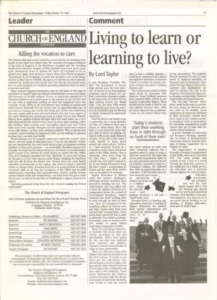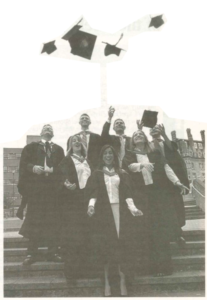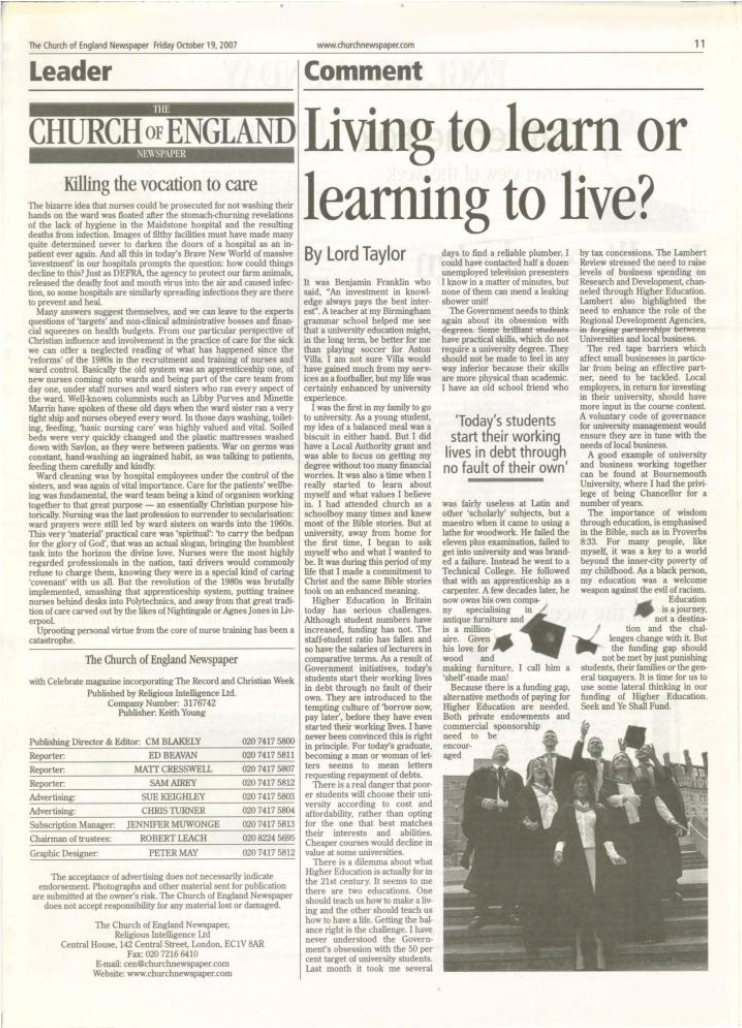Church of England Article By Lord Taylor of Warwick

It was Benjamin Franklin who said, “An investment in knowledge always pays the best interest“. A teacher at my Birmingham grammar school helped me see that a university education might, in the long term, be better for me than playing soccer for Aston Villa. I am not sure Villa would have gained much from my services as a footballer, but my life was certainly enhanced by university experience.
I was the first in my family to go to university. As a young student, my idea of a balanced meal was a biscuit in either hand. But I did have a local Authority grant and was able to focus on getting my degree without too many financial worries. It was also a time when I really started to learn about myself and what values I believe in. I had attended church as a schoolboy many times and knew most of the Bible stories. But at university, away from home for the first time, I began to ask myself who and what I wanted to be. It was during this period of my life that I made a commitment to Christ and the same Bible stories took on an enhanced meaning.
Higher Education in Britain today has serious challenges. Although student numbers have increased, funding has not. The staff-student ratio has fallen and so have die salaries of lecturers in comparative terms. As a result of Government initiatives, today’s students start their working lives in debt through no fault of their own. They are introduced to the tempting culture of ‘borrow now, pay later’, before they have even started their working lives. I have never been convinced this is right in principle. For today’s graduate, becoming a man or woman of letters seems to mean letters requesting repayment of debts.
There is a real danger that poorer students will choose their university according to cost and affordability, rather than opting for the one that best matches their interests and abilities. Cheaper courses would decline in value at some universities.
There is a dilemma about what Higher Education is actually for in the 21st century. It seems to me there are two educations. One should teach us how to make a living and the other should teach us how to have a life. Getting the balance right is the challenge. I have never understood the Government’s obsession with the 50 percent target of university students. Last month it took me several days to find a reliable plumber. I could have contacted half a dozen unemployed television presenters I know in a matter of minutes, but none of them can mend a leaking shower unit!
The Government needs to think again about its obsession with degrees. Some brilliant students have practical skills, which do not require a university degree. They should not be made to feel in any way inferior because their skills are more physical than academic. I have an old school friend who was fairly useless at Latin and other ‘scholarly’ subjects, but a maestro when it came to using a lathe for woodwork. He failed the eleven plus examination, failed to get into university and was branded a failure. Instead he went to a Technical College. He followed that with an apprenticeship as a carpenter. A few decades later, he now owns his own company specialising in antique furniture and is a millionaire. Given his love for wood and making furniture, I call him a ‘shelf’-made man!
Because there is a funding gap, alternative methods of paying for Higher Education are needed. Both private endowments and commercial sponsorship need to be encouraged by tax concessions. The Lambert Review stressed the need to raise levels of business spending on Research and Development, channeled through Higher Education. Lambert also highlighted the need to enhance the role of the Regional Development Agencies, in forging partnerships between Universities and local business.
The red tape barriers which affect small businesses in particular from being an effective partner, need to be tackled. Local employers, in return for investing in their university, should have more input in the course content. A voluntary code of governance for university management would ensure they are in tune with the needs of local business.
A good example of university and business working together can be found at Bournemouth University, where I had the privilege of being Chancellor for a number of years.
 The importance of wisdom through education, is emphasised in the Bible, such as in Proverbs 8:33. For many people, like myself, it was a key to a world beyond the inner-city poverty of my childhood. As a black person, my education was a welcome weapon against the evil of racism. Education is a journey, not a destination and the challenges change with it. But the funding gap should not be met by just punishing students, their families or the general taxpayers. It is time for us to use some lateral thinking in our funding of Higher Education. Seek and Ye Shall Fund.
The importance of wisdom through education, is emphasised in the Bible, such as in Proverbs 8:33. For many people, like myself, it was a key to a world beyond the inner-city poverty of my childhood. As a black person, my education was a welcome weapon against the evil of racism. Education is a journey, not a destination and the challenges change with it. But the funding gap should not be met by just punishing students, their families or the general taxpayers. It is time for us to use some lateral thinking in our funding of Higher Education. Seek and Ye Shall Fund.
